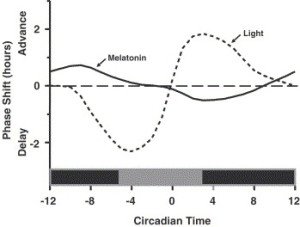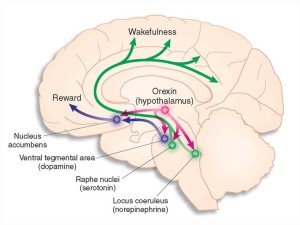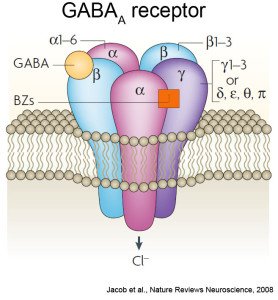Must Reads
- Treacherous Side Effects of Lunesta To Watch Out For
- An emerging paradox: benzodiazepines rescue deficits in transgenic Alzheimer’s mice by improving slow wave sleep (SWS) coherence
- Why Remeron for Sleep: Not All It's Cracked Up To Be
- Increase Slow Wave Sleep (SWS) To Improve Intellectual Performance
- Slow Wave Sleep Integrity and Cortical Thickness Are Tightly Linked
- Best Sleep Aids Available: Belsomra (Suvorexant) And Ramelteon (Rozerem)

Unlike benzodiazepines, z-drugs, and other habit-forming sleep aids, Suvorexant and Ramelteon bind to the receptors for melatonin and orexin. (Melatonin is a a sleep-promoting neurohormone produced by the pineal gland and orexin is a wake-promoting neuropeptide.) Insomniacs and sufferers of delayed sleep phase disorder will be pleased to learn that their sleep conditions can be managed more safely, sustainably and with fewer long-term risks using these recently approved drugs.
Even subtle impairments in sleep architecture deleteriously affects cognitive performance. It has recently been reported that certain sleep parameters, such as sleep spindles, are reliably linked to IQ. It is therefore not so hard to believe that artificially augmenting the depth and restorativeness of sleep may also enhance cognitive performance. You may be interested in this list of tips to improve sleep quality.
A Robust Sleep/Wake Cycle Enhances Cognitive Resilience
The importance of a good nights sleep cannot be overstated, especially given the link between chronic sleep restriction and a smorgasbord of ill health effects ranging from obesity to depression. Admittedly, in the latter case causality is confounded, since in some cases insomnia may be a compensatory mechanism to restore neurotransmitter homeostasis to combat depressive symptomatology.
But improvement in sleep quality confers incontestable cognitive benefits. The electroencephalographic parameter delta power has come to be almost synonymous with “sleep pressure”, and a greater accumulation of sleep pressure by the end of the day results in a more robust sleep/wake cycle and therefore deeper, more restorative sleep.
Anything that dampens the amplitude of diurnal rhythms is bound to be depressogenic and generally bad news, especially since diurnal outputs from the suprachiasmatic nucleus (SCN) of the hypothalamus regulate everything from body temperature to how hungry you are at lunch. Some neuroscientists maintain that depression is actually first and foremost a sleep disorder, a disease of dysregulated circadian rhythm and sleep homeostasis. After all, the primary purpose of sleep may ultimately be memory consolidation vis-a-vis synaptic downscaling and the homeostatic control of neuronal firing rate. Meanwhile, others glibly (yet compellingly) argue that the only reason we sleep is simply because we get sleepy.
It has long been appreciated that sleep deprivation impairs cognitive performance and conversely, the cognitively impaired exhibit lower sleep efficiency, e.g., fragmentation of sleep architecture. This sleep-cognition link is so profound that sleep disruption may be the earliest and most sensitive prodromal sign of future dementia.
Benzodiazepines, Z-drugs and Tricyclics
Navigating the landscape of potentially treacherous sleep medications is challenging, too. Benzodiazepines and z-drugs alike, all of which allosterically modulate the various subtypes of the gamma-amino-butyric acid (GABA) A receptor, including Xanax, Ambien and Lunesta, while effective, are associated with protracted cognitive impairment that in some cases does not resolve after discontinuation of the offending drug.
Tricyclics have been used to treat insomnia for decades, but they come with their own host of problems. Nearly all tricyclics are anticholingeric, which directly and unequivocally impairs memory and cognitive performance. The anticholingeric agent Scopolamine is used in animal models of neurodegenerative disease because it robustly interferes with memory consolidation. Benadryl (diphenhydramine) and doxylamine succinate are two over-the-counter sleep aids that are also highly anticholingeric and therefore carry the same adverse effects on the central nervous system (CNS).
Remeron (Mirtazepine) and Seroquel (Quetiapine) have been effectively used off-label to manage insomnia, but both of these drugs cause an insidious onset of weight gain, and quetiapine is widely known to be diabetogenic.
So what’s left in the pharmacological armamentarium? Does a perfectly safe magic bullet exist for insomnia?
 Kind of. Ramelteon (Rozerem) and Belsomra (Suvorexant) may represent the best and safest sleep-promoting drugs available today. Rozerem is a melatonin agonist which binds to the meletonin receptors MT1 and MT2 with high affinity and specificity. Of course, melatonin is the natural ligand for these receptors.
Kind of. Ramelteon (Rozerem) and Belsomra (Suvorexant) may represent the best and safest sleep-promoting drugs available today. Rozerem is a melatonin agonist which binds to the meletonin receptors MT1 and MT2 with high affinity and specificity. Of course, melatonin is the natural ligand for these receptors.
Suvorexant is a drug with a novel pharmacologic profile that was approved by the FDA this year for the treatment of insomnia. Suvorexant highjacks endogenous orexinergic circuits by antagonizing orexin receptors to promote sleep. Orexin/hypocretin is a neuropeptide involved in the maintenance of wakefulness; narcolepsy (hypersomnolence) is thought to result from the autoimmune destruction of orexinergic neurons. Hence, suvorexant-induced orexinergic blockade promotes sleep.
 It is true that Suvorexant and Rozerem are likely less effective than their benzodiazepine and tricyclic counterparts. But this difference in efficacy is more than made up for by their vastly superior safety profile, given the inherent risks of benzodiazepines and anticholingeric drugs.
It is true that Suvorexant and Rozerem are likely less effective than their benzodiazepine and tricyclic counterparts. But this difference in efficacy is more than made up for by their vastly superior safety profile, given the inherent risks of benzodiazepines and anticholingeric drugs.

